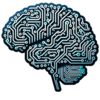| Part of a series on |
| Artificial intelligence |
|---|
Artificial general intelligence (AGI) is a theoretical type of artificial intelligence (AI) that falls within the lower and upper limits of human cognitive capabilities across a wide range of cognitive tasks.[1][2][3] This contrasts with narrow AI, which is limited to specific tasks.[4] Artificial superintelligence (ASI), refers to types of intelligence that range from being only marginally smarter than the upper limits of human intelligence to greatly exceeding human cognitive capabilities by orders of magnitude. AGI is considered one of the definitions of strong AI.
AGI intelligence may be comparable to, match, differ from, or even appear alien-like relative to human intelligence, encompassing a spectrum of possible cognitive architectures and capabilities that includes the spectrum of human-level intelligence.[5]
Creating AGI is a primary goal of AI research and of companies such as OpenAI[6] and Meta.[7] A 2020 survey identified 72 active AGI R&D projects spread across 37 countries.[8]
The timeline for achieving AGI remains a subject of ongoing debate among researchers and experts. As of 2024, some argue that it may be possible in years or decades; others maintain it might take a century or longer; a minority believe it may never be achieved, while another minority says it already exists.[9][10] Notable AI researcher Geoffrey Hinton has expressed concerns about the rapid progress towards AGI, suggesting it could be achieved sooner than many expect.[11]
There is debate on the exact definition of AGI, and regarding whether modern large language models (LLMs) such as GPT-4 are early forms of AGI.[12] AGI is a common topic in science fiction and futures studies.
Contention exists over whether AGI represents an existential risk.[13][14] Many AI personalities have stated that mitigating the risk of human extinction from AI should be a global priority.[15] Others find the development of AGI to be too remote to present such a risk.
- ^ Heaven, Will Douglas (16 November 2023). "Google DeepMind wants to define what counts as artificial general intelligence". MIT Technology Review. Retrieved 1 March 2024.
- ^ Goertzel, Ben; Pennachin, Cassio (2007). "Artificial General Intelligence". Cognitive Technologies. doi:10.1007/978-3-540-68677-4. ISBN 978-3-540-23733-4.
AGI refers to AI systems that possess a reasonable degree of self-understanding and autonomous self-control, and have the ability to solve a variety of complex problems in a variety of contexts, and to learn to solve new problems that they didn't know about at the time of their creation.
- ^ McCarthy, John (2007). What is Artificial Intelligence?. Stanford University.
The ultimate effort is to make computer programs that can solve problems and achieve goals in the world as well as humans. However, many people involved in particular research areas are much less ambitious.
- ^ Krishna, Sri (9 February 2023). "What is artificial narrow intelligence (ANI)?". VentureBeat. Retrieved 1 March 2024.
- ^ "Basic Question". www-formal.stanford.edu. Retrieved 9 September 2024.
Computer programs have plenty of speed and memory but their abilities correspond to the intellectual mechanisms that program designers understand well enough to put in programs. Some abilities that children normally don't develop till they are teenagers may be in, and some abilities possessed by two year olds are still out. The matter is further complicated by the fact that the cognitive sciences still have not succeeded in determining exactly what the human abilities are. Very likely the organization of the intellectual mechanisms for AI can usefully be different from that in people.
- ^ "OpenAI Charter". openai.com. Retrieved 6 April 2023.
- ^ Heath, Alex (18 January 2024). "Mark Zuckerberg's new goal is creating artificial general intelligence". The Verge. Retrieved 13 June 2024.
- ^ Baum, Seth, A Survey of Artificial General Intelligence Projects for Ethics, Risk, and Policy (PDF), Global Catastrophic Risk Institute Working Paper 20, archived (PDF) from the original on 14 November 2021, retrieved 13 January 2022
- ^ "AI timelines: What do experts in artificial intelligence expect for the future?". Our World in Data. Retrieved 6 April 2023.
- ^ Arcas, Blaise Agüera y (10 October 2023). "Artificial General Intelligence Is Already Here".
{{cite journal}}: Cite journal requires|journal=(help) - ^ "AI pioneer Geoffrey Hinton quits Google and warns of danger ahead". The New York Times. 1 May 2023. Retrieved 2 May 2023.
- ^ "Microsoft Researchers Claim GPT-4 Is Showing "Sparks" of AGI". Futurism. 23 March 2023. Retrieved 13 December 2023.
- ^ Morozov, Evgeny (30 June 2023). "The True Threat of Artificial Intelligence". The New York Times. Archived from the original on 30 June 2023. Retrieved 30 June 2023.
- ^ "Impressed by artificial intelligence? Experts say AGI is coming next, and it has 'existential' risks". ABC News. 23 March 2023. Retrieved 6 April 2023.
- ^ Roose, Kevin (30 May 2023). "A.I. Poses 'Risk of Extinction,' Industry Leaders Warn". The New York Times.
